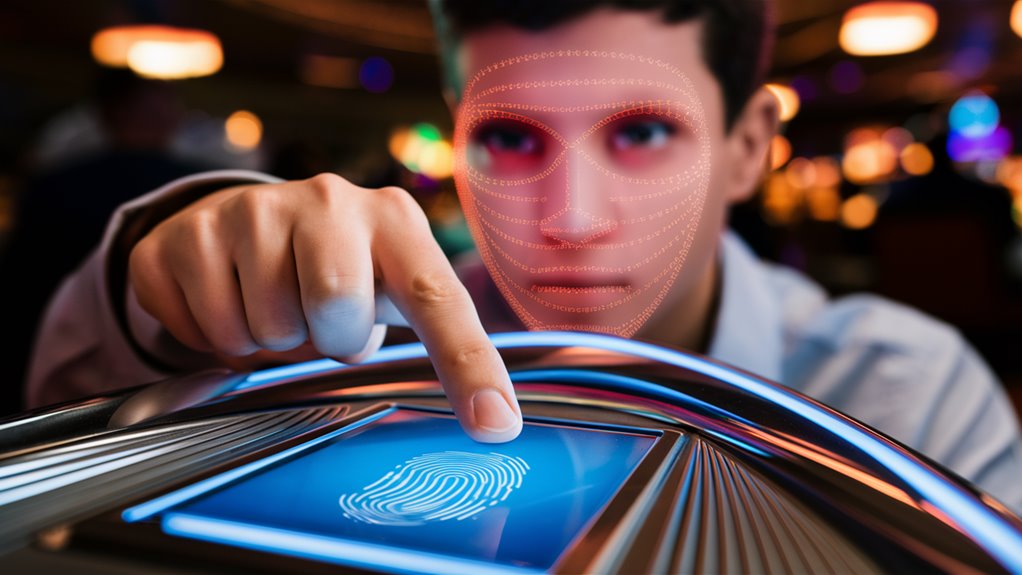Biometric Betting: The Evolution of Secure Online Gambling Authentication
As the online betting landscape evolves, biometric authentication is revolutionizing how players access their gambling accounts. This transformation marks a significant shift from traditional password systems to more sophisticated fingerprint and facial recognition technologies.
The Rise of Biometric Security in Online Betting
Fingerprint scanning and Face ID systems are becoming increasingly prevalent across major betting platforms. These technologies offer unparalleled security while streamlining the login process. The integration of biometric authentication provides a dual-layer protection system that significantly reduces the risk of unauthorized access and fraud.
Advanced Security Features
- Fingerprint Recognition Technology
- 3D Facial Mapping Systems
- Liveness Detection
- Multi-factor Authentication Integration
- Real-time Fraud Prevention
Benefits of Biometric Authentication in Gambling
Enhanced security measures through biometric authentication deliver multiple advantages:
- Instant Account Access
- Reduced Identity Theft Risk
- Elimination of Password Management
- Seamless Multi-device Integration
- Improved Regulatory Compliance
Addressing Privacy Concerns
While biometric authentication offers superior security, privacy considerations remain paramount. Leading betting platforms implement military-grade encryption for biometric data storage, ensuring user information remains protected through:
- Encrypted Data Storage
- Decentralized Security Systems
- Regular Security Audits
- Strict Data Protection Protocols
Frequently Asked Questions
Q: How secure is biometric betting authentication?
A: Biometric authentication provides military-grade security through encrypted data storage and advanced recognition algorithms.
Q: Can biometric data be compromised?
A: Modern encryption methods make biometric data extremely difficult to compromise, with multiple security layers protecting user information.
Q: What happens if the biometric scanner fails?
A: Betting platforms maintain backup authentication methods, including traditional passwords and two-factor authentication.
Q: Are facial recognition systems reliable for betting authentication?
A: Modern facial recognition systems achieve 99.9% accuracy with liveness detection to prevent spoofing attempts.
Q: How do betting sites store biometric data?
A: Biometric data is stored using encrypted tokens rather than actual fingerprint or facial images, ensuring maximum security.
The Rise of Biometric Security
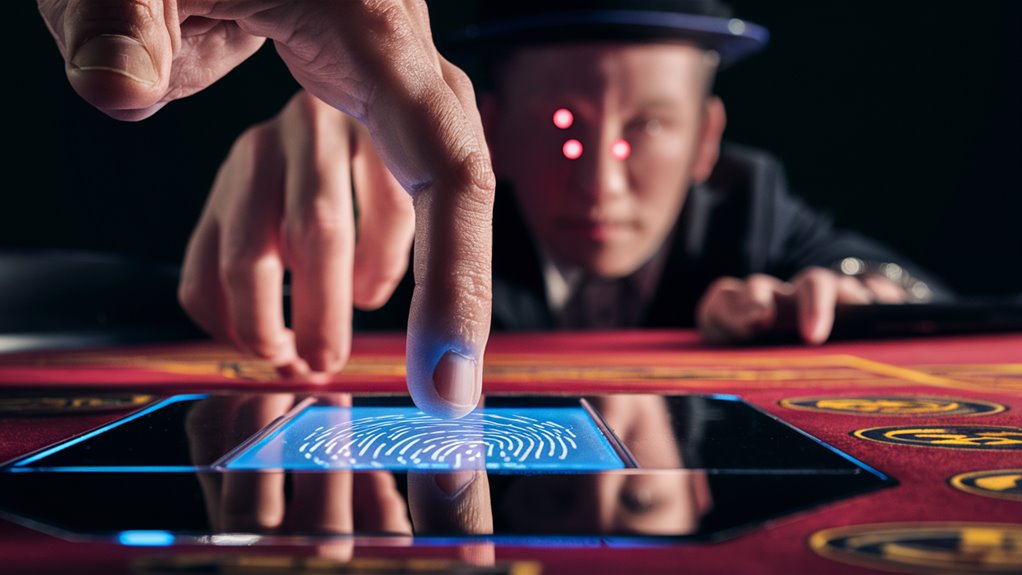
The Evolution and Impact of Biometric Security Systems
Understanding Modern Biometric Authentication
Biometric security has transformed from theoretical concept to practical application over the last decade.
Advanced authentication systems now incorporate fingerprint scanning, facial recognition, and iris detection as standard security features across various devices and platforms.
This technological evolution represents a significant shift in how we approach personal and institutional security.
Key Components of Biometric Authentication
The implementation of biometric access control has revolutionized security protocols. These systems leverage unique biological identifiers for authentication, eliminating the need for traditional credentials.
Biometric verification offers superior security through:
- Fingerprint recognition technology
- Advanced facial mapping systems
- Retinal and iris scanning capabilities
- Voice pattern authentication
- Behavioral biometric analysis
Enhanced Security Through Biological Authentication
Biometric authentication systems provide robust security through their reliance on unique physiological characteristics.
Unlike conventional security measures, biometric identifiers can’t be easily compromised or duplicated.
Modern systems incorporate anti-spoofing technology and advanced sensor capabilities to detect and prevent unauthorized access attempts.
Frequently Asked Questions About Biometric Security
Q1: How secure is biometric authentication?
Biometric security offers exceptional protection through unique biological markers that are extremely difficult to replicate or forge.
Q2: Can biometric data be hacked?
While no system is completely impenetrable, biometric systems encrypt data and utilize secure storage methods to protect user information.
Q3: What’re the most common types of biometric authentication?
Fingerprint scanning, facial recognition, and iris detection are the most widely implemented forms.
Q4: How does biometric verification work?
Biometric systems capture unique biological traits, convert them to digital data, and match them against stored templates for authentication.
Q5: Are biometric systems more reliable than traditional passwords?
Biometric authentication generally provides greater security and convenience compared to password-based systems, with lower risk of compromise.
How Fingerprint Authentication Works
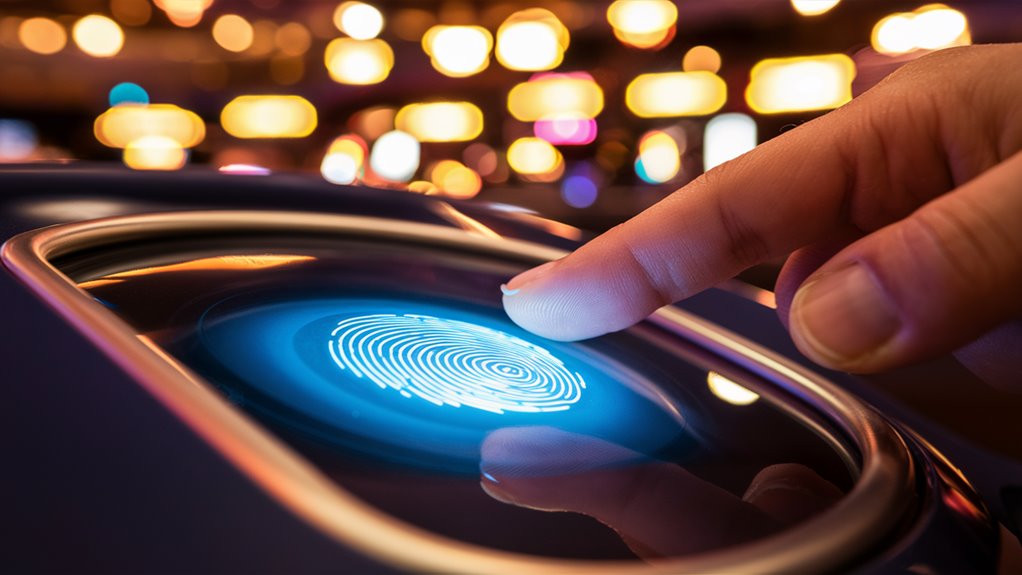
How Fingerprint Authentication Works: A Comprehensive Guide
Understanding Fingerprint Authentication Technology
Fingerprint authentication represents one of the most sophisticated and widely implemented biometric security solutions in modern technology.
The system operates through advanced scanning technology that captures unique fingerprint characteristics with remarkable precision.
When a user places their finger on a biometric scanner, specialized sensors detect and record the distinct patterns of ridges, valleys, and minutiae points that make each fingerprint unique.
The Digital Conversion Process
The authentication process converts physical fingerprint characteristics into a secure digital template.
This mathematical representation encrypts key fingerprint features into a complex algorithmic format.
Importantly, the system never stores actual fingerprint images, instead utilizing encrypted templates to maintain robust security protocols and protect user privacy.
Authentication Mechanism and Security Features
During each login attempt, the system executes a sophisticated matching process:
- Captures a new fingerprint scan
- Creates a real-time digital template
- Compares against stored encrypted data
- Validates authentication above specific security thresholds
- Grants or denies access based on match percentage
Modern Applications and Implementation
Biometric authentication systems now power security features across multiple platforms:
- Smartphones and mobile devices
- Banking applications
- Access control systems
- Identity verification platforms
- Secure payment solutions
#
Frequently Asked Questions
Q: How accurate is fingerprint authentication?
A: Modern fingerprint authentication systems achieve accuracy rates above 99.9% with advanced matching algorithms.
Q: Can fingerprint data be stolen or hacked?
A: Encrypted templates make unauthorized access extremely difficult, as actual fingerprint images are never stored.
Q: Does environmental factors affect fingerprint scanning?
A: Moisture, dirt, or cuts can impact scan quality, but advanced sensors compensate for minor variations.
Q: Is fingerprint authentication safer than passwords?
A: Fingerprint authentication typically provides stronger security due to unique biological characteristics that can’t be easily replicated.
Q: How long does fingerprint authentication take?
A: Modern systems complete the entire authentication process in less than one second, offering both security and convenience.
Face Recognition in Online Gambling
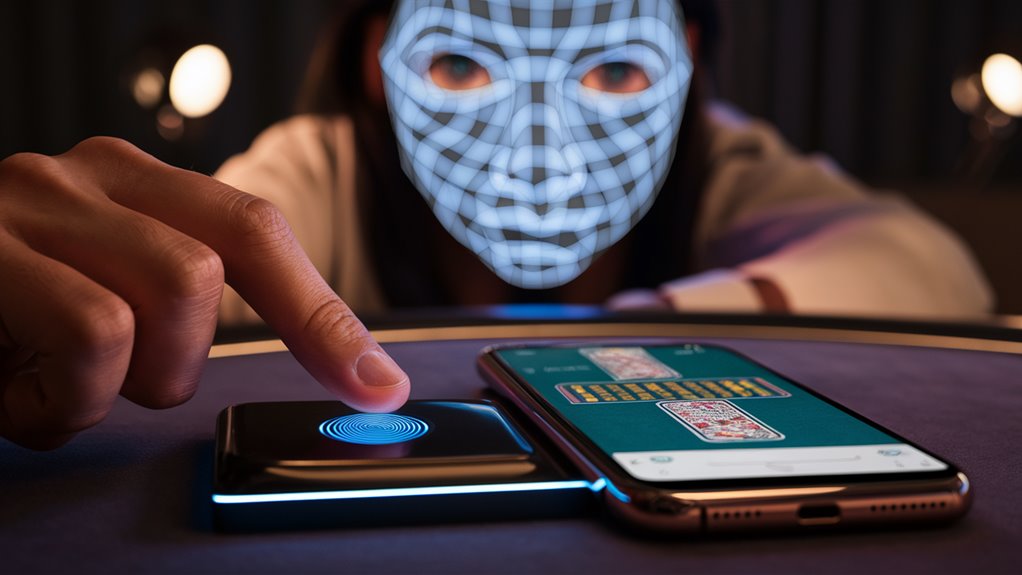
Face Recognition Technology in Online Gambling: A Comprehensive Security Guide
Understanding Face Recognition in iGaming Security
Face recognition technology has fundamentally transformed online gambling security protocols by implementing real-time biometric verification.
This sophisticated system creates an impenetrable layer of protection for players engaging in online betting activities through continuous identity authentication.
Advanced Biometric Authentication Process
The facial recognition system operates by analyzing distinctive facial characteristics through advanced algorithms.
These systems map over 80 unique nodal points on a player’s face, creating a detailed biometric template that includes:
- Facial geometry measurements
- Distance ratios between key features
- Texture analysis of skin patterns
- Depth perception data points
- Three-dimensional modeling
Enhanced Security Features
Liveness Detection
Modern anti-spoofing technology incorporates advanced liveness detection to prevent fraudulent access attempts through:
- Motion analysis
- Depth sensing
- Texture verification
- Response testing
Continuous Monitoring
The system maintains persistent authentication throughout betting sessions by:
- Real-time facial scanning
- Automated verification checks
- Instant threat detection
- 먹튀검증커뮤니티
- Immediate account protection protocols
Frequently Asked Questions
Q: How accurate is facial recognition in online gambling?
A: Modern facial recognition systems achieve 99.9% accuracy with proper lighting and camera positioning.
Q: Can facial recognition be fooled by photographs?
A: No, advanced liveness detection prevents photo-based spoofing attempts.
Q: Is facial biometric data stored securely?
A: Yes, data is encrypted and stored following strict security protocols and privacy regulations.
Q: How does continuous monitoring affect gaming performance?
A: The system runs efficiently in the background with minimal impact on user experience.
Q: What happens if facial verification fails during a session?
A: The system initiates secondary verification protocols while temporarily securing the account.
Current Market Implementation Examples
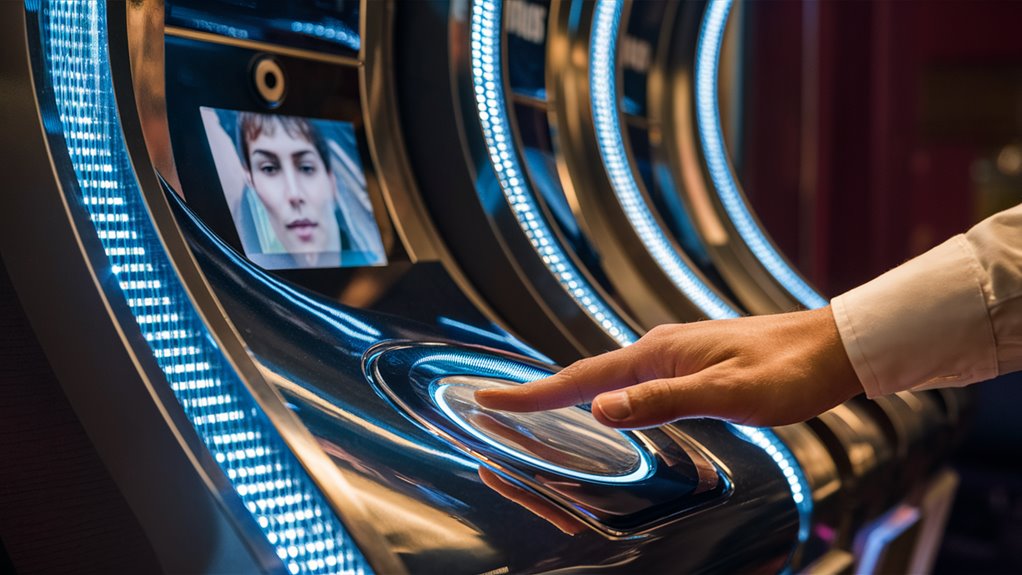
Market Implementation of Facial Recognition in Online Gambling
Current Industry Leaders and Solutions
Leading gambling platforms have integrated sophisticated facial recognition systems across their operations.
Bet365 and William Hill demonstrate industry leadership through robust facial verification protocols during both registration and authentication processes, while BetMGM leverages Apple’s Face ID technology for enhanced iOS platform security.
Regional Implementation Trends
Asian Market Developments
GGBet stands at the forefront of Asian market innovation with their AI-powered facial matching system, requiring live selfie verification for high-value transactions.
The platform’s implementation represents a significant advancement in real-time biometric authentication.
European Integration
Flutter Entertainment’s PokerStars exemplifies comprehensive biometric security through multi-territorial deployment of facial recognition systems integrated with document verification, strengthening their KYC compliance framework.
Svenska Spel has pioneered continuous facial monitoring during active gaming sessions, establishing new standards for account security and age verification.
Pacific Region Adoption
In the Australian market, Tabcorp’s TAB application implements advanced liveness detection alongside facial recognition technology, ensuring physical presence verification during account access attempts.
This dual-layer approach significantly enhances security protocols.
Frequently Asked Questions
Q: How does facial recognition prevent underage gambling?
A: Facial recognition systems verify age through biometric markers and cross-reference with official identification documents.
Q: What security measures protect facial recognition data?
A: Platforms employ encrypted storage, secure transmission protocols, and compliance with data protection regulations.
Q: Can facial recognition be fooled by photographs?
A: Modern systems include liveness detection to ensure only real, present individuals can authenticate.
Q: How does continuous facial monitoring work?
A: The system periodically captures and verifies the user’s face during active sessions to prevent account sharing.
Q: Are facial recognition systems mandatory for online gambling?
A: Requirements vary by jurisdiction, but many operators now implement these systems voluntarily for enhanced security.
Privacy Concerns and Data Protection
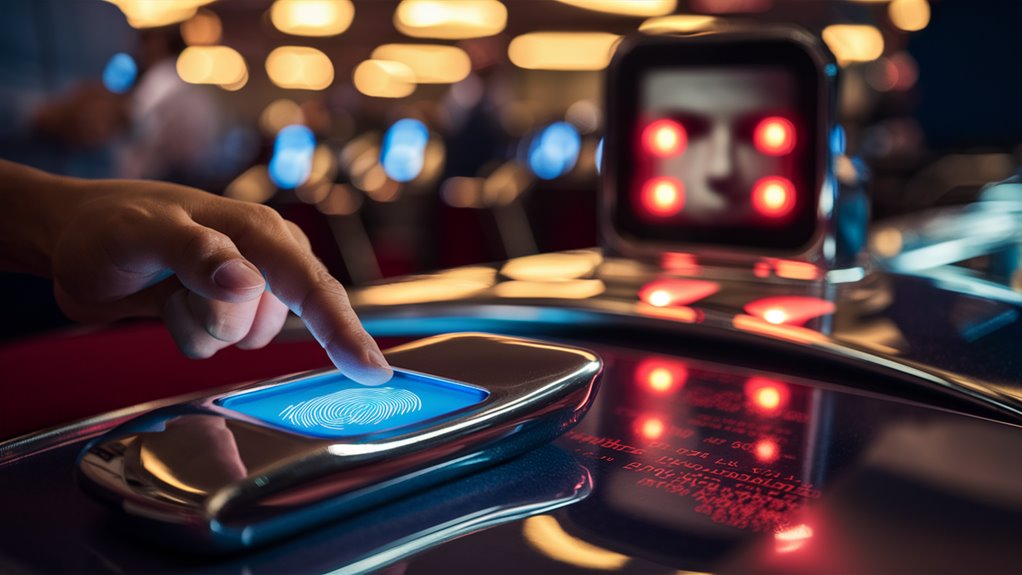
Biometric Data Privacy in Online Gambling: Essential Security Considerations
Understanding Biometric Data Protection Risks
The integration of biometric authentication in online gambling platforms introduces critical privacy considerations that demand careful attention.
Biometric identifiers, including fingerprints, facial scans, and retinal patterns, represent irreplaceable personal data that requires exceptional protection measures. These unique biological markers, once compromised, can’t be changed like passwords or usernames.
Security Protocols and Data Storage
Advanced encryption systems and secure storage infrastructure form the foundation of biometric data protection in gambling platforms.
Implementation of military-grade encryption and distributed storage solutions helps safeguard sensitive biometric information from unauthorized access. Industry-leading platforms employ multi-layer security protocols to prevent data breaches and maintain user privacy.
Regulatory Compliance and Legal Framework
International data protection regulations, particularly the GDPR (General Data Protection Regulation), establish strict guidelines for biometric data handling. Gambling operators must maintain:
- Explicit user consent documentation
- Transparent data processing policies
- Regular security audits
- Clear data retention schedules
#
Frequently Asked Questions
Q: How is biometric data stored securely?
A: Through encrypted databases using advanced cryptographic algorithms and segregated storage systems.
Q: Can biometric data be permanently deleted?
A: Yes, reputable platforms provide mechanisms for complete data deletion upon user request.
Q: What happens if biometric data is compromised?
A: Platforms must immediately notify affected users and implement breach containment protocols.
Q: How long do gambling sites retain biometric data?
A: Retention periods vary by jurisdiction but typically align with regulatory requirements and user account status.
Q: Are gambling platforms required to encrypt biometric data?
A: Yes, regulatory frameworks mandate encryption and secure storage of all biometric information.
Benefits for Players and Operators
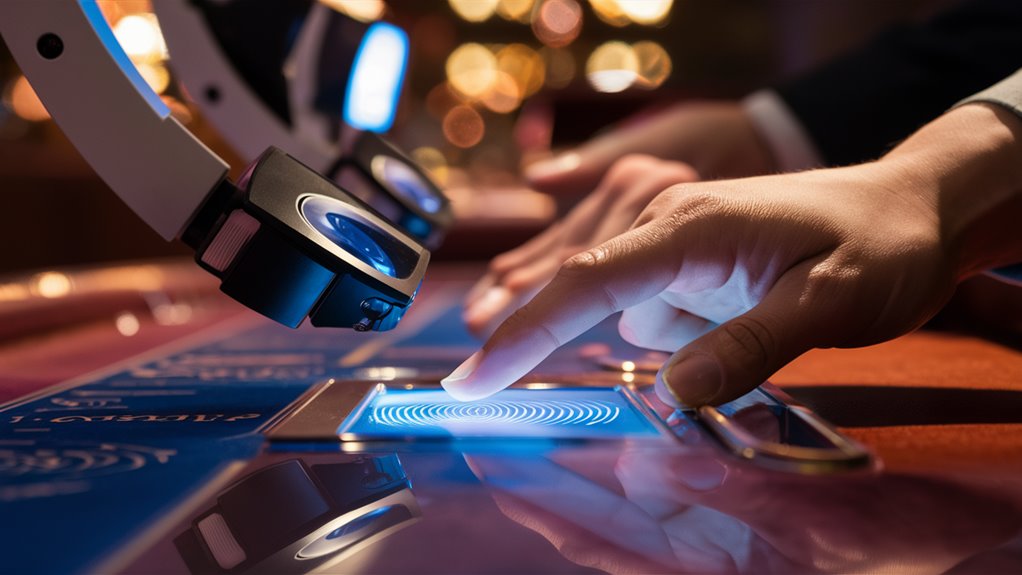
Benefits of Biometric Technology in Online Gambling
Player Advantages
Biometric authentication transforms the online gambling experience through enhanced security and convenience. Instant account access via fingerprint or facial recognition eliminates password management while ensuring maximum protection of player funds.
This cutting-edge technology enables seamless gameplay without compromising security protocols.
Advanced player verification systems create an impenetrable barrier against unauthorized access, protecting sensitive financial information and betting history.
The implementation of biometric safeguards ensures that each account remains exclusively accessible to its rightful owner.
Operator Benefits
Robust fraud prevention measures through biometric integration significantly reduce instances of identity theft and account manipulation.
This technology enables operators to maintain stringent compliance with regulatory requirements while streamlining KYC procedures.
The system’s ability to prevent account sharing and underage gambling strengthens responsible gaming initiatives. Automated recognition technology facilitates immediate identification of self-excluded players, supporting comprehensive problem gambling prevention.
Enhanced User Experience
Biometric integration delivers a frictionless gaming environment with instant authentication. Players benefit from immediate access to:
- Quick deposits and withdrawals
- Personalized gaming recommendations
- Targeted promotional offers
- Customized responsible gambling tools
## Frequently Asked Questions
Q: How secure is biometric authentication in online gambling?
A: Biometric data utilizes military-grade encryption and can’t be replicated or compromised through conventional hacking methods.
Q: What types of biometric verification are available?
A: Common methods include fingerprint scanning, facial recognition, voice authentication, and retinal scanning.
Q: Can biometric data be stolen or duplicated?
A: Modern biometric systems incorporate liveness detection and anti-spoofing measures, making replication virtually impossible.
Q: How does biometric authentication improve responsible gambling?
A: It ensures precise player identification, enabling accurate monitoring of gambling patterns and immediate enforcement of self-exclusion programs.
Q: Will biometric authentication work across multiple devices?
A: Yes, modern biometric systems synchronize across authorized devices while maintaining strict security protocols.
Future Applications in Gaming
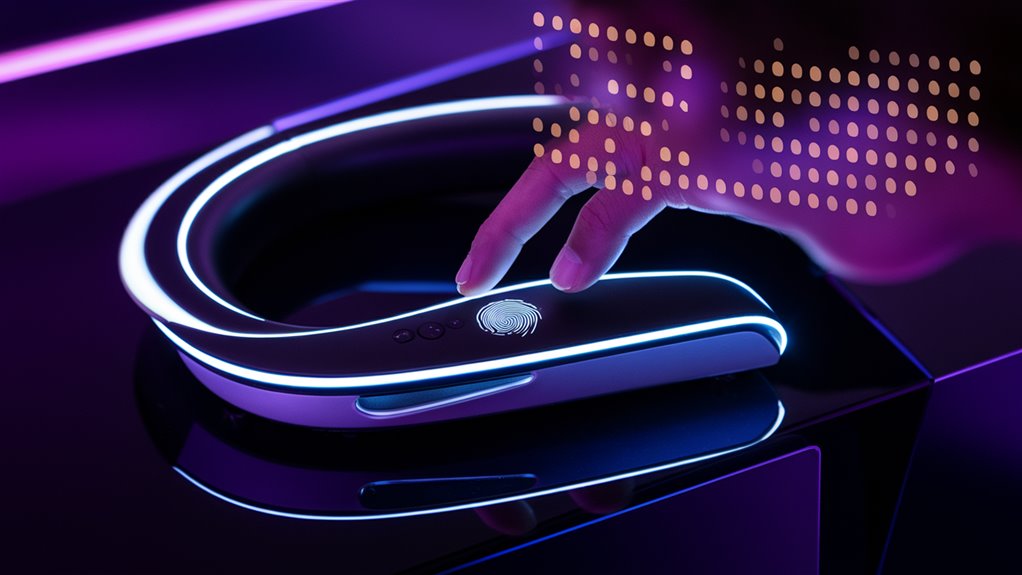
The Future of Biometric Technology in Gaming
Advanced Biometric Gaming Integration
Biometric technology is poised to transform gaming experiences far beyond basic security measures.
Real-time emotion recognition systems will enable gaming platforms to dynamically adjust difficulty levels based on player engagement. This sophisticated personalization creates highly immersive experiences that adapt to individual player preferences and skill levels.
Gesture Control and Eye-Tracking Innovations
Advanced gesture recognition and eye-tracking technology represent groundbreaking developments in gaming interfaces.
These systems analyze subtle physical indicators like pupil dilation and hand movements, introducing new strategic elements to classic games like poker. This technology enhances both accessibility and gameplay depth through natural interaction methods.
Behavioral Biometrics and Player Recognition
Sophisticated behavioral analysis systems identify players through unique gaming patterns, betting behaviors, and device interaction styles. This comprehensive approach to player identification enables:
- Personalized game recommendations
- Enhanced security measures
- Responsible gaming protocols
- Customized user experiences
Virtual Reality and Biometric Authentication
The integration of VR technology with biometric authentication creates seamless gaming environments where physical movements and biological markers serve as natural interfaces. This convergence enables:
- Immersive gameplay experiences
- Enhanced security protocols
- Real-time adaptation
- Personalized content delivery
Frequently Asked Questions
Q: How will biometric technology improve gaming security?
A: Biometric technology implements multi-factor authentication using physical and behavioral markers, significantly enhancing security measures.
Q: Can biometric gaming systems protect player privacy?
A: Advanced encryption and data protection protocols ensure secure storage and processing of biometric information.
Q: What impact will emotion recognition have on gaming?
A: Emotion recognition enables dynamic difficulty adjustment and personalized content delivery based on player engagement levels.
Q: How will VR integration affect biometric gaming?
A: VR integration creates immersive environments where physical movements and biological markers serve as natural game controls.
Q: When will these technologies become widely available?
A: Many biometric gaming features are currently in development, with widespread implementation expected within the next 3-5 years.
Common Questions
Can Biometric Authentication Work With Existing Mobile Betting Apps?
Biometric Authentication Integration with Mobile Betting Apps
Biometric authentication is fully compatible with most modern mobile betting applications, providing enhanced security and convenient access for users. This technology requires a device equipped with fingerprint sensors or facial recognition capabilities, along with up-to-date operating system software.
Compatibility Requirements
To utilize biometric login features on betting apps, users need:
- A smartphone or tablet with integrated biometric hardware
- iOS 13+ or Android 8.0+ operating system
- Latest version of the betting application
- Properly configured device security settings
Benefits of Biometric Authentication
Mobile betting security is significantly enhanced through:
- Instant secure access without password entry
- Reduced risk of unauthorized account access
- Seamless user experience during login processes
- Enhanced protection for financial transactions
Frequently Asked Questions
Q: Which betting apps support biometric authentication?
Most major betting platforms now integrate biometric login options, including industry leaders like DraftKings, FanDuel, and Bet365.
Q: Is biometric authentication safe for betting apps?
Yes, biometric data is encrypted and stored locally on the device, offering superior security compared to traditional passwords.
Q: Can I switch between fingerprint and face recognition?
Most apps allow users to toggle between available biometric options based on device capabilities.
Q: Do I need to set up biometric authentication separately?
Initial setup requires enabling biometric features in both device settings and the betting app’s security preferences.
Q: Will biometric login work if my device is offline?
Yes, biometric authentication functions without internet connectivity, though betting activities require an online connection.
What Happens if My Fingerprint Scanner or Face ID Stops Working?
What to Do When Biometric Authentication Fails
If your fingerprint scanner or Face ID stops working, several secure alternatives are available to maintain account access. Here’s a comprehensive guide to managing authentication issues:
Primary Backup Methods
Password Authentication
- Navigate to account settings
- Select “Alternative Login Methods”
- Enable password/PIN login
- Enter existing credentials to confirm
PIN Recovery
- Access security settings
- Choose “Reset PIN”
- Verify identity through email/phone
- Create new PIN following security guidelines
Additional Security Options
Two-Factor Authentication (2FA)
- Enable SMS verification
- Set up authenticator app backup
- Configure recovery codes
- Store backup codes securely
Q&A Section
Common Authentication Issues FAQ:
1. Can I still access my account if biometrics fail?
Yes, through password, PIN, or 2FA alternatives.
2. How long does authentication reset take?
Typically 5-10 minutes for immediate methods, up to 24 hours for support-assisted recovery.
3. Will I lose account data when switching authentication?
No, account data remains secure during authentication changes.
4. Is password login less secure than biometrics?
Strong passwords with 2FA provide comparable security to biometric methods.
5. Can I use multiple authentication methods?
Yes, enabling multiple methods provides backup access options.
Contact support for additional assistance with authentication reset procedures or account recovery.
Are Biometric Betting Systems Available in All Countries?
Biometric Betting Systems: Global Availability and Regulations
Understanding Regional Restrictions
Biometric betting systems operate under complex regulatory frameworks that vary significantly across jurisdictions. Availability is strictly limited to regions where both online gambling and biometric identity verification are legally sanctioned. This creates a patchwork of accessibility worldwide, with some nations embracing the technology while others maintain strict prohibitions.
Current Market Distribution
Major gambling markets like the United Kingdom, Malta, and parts of Australia have implemented comprehensive frameworks for biometric betting systems. However, many jurisdictions, including several U.S. states and Asian countries, maintain restrictions on these technologies due to privacy concerns and existing gambling regulations.
Regulatory Requirements
Markets permitting biometric betting systems typically require:
- Strong data protection measures
- Compliance with local privacy laws
- Regular security audits
- Integration with responsible gambling protocols
Implementation Challenges
The global rollout of biometric betting faces several obstacles:
- Cross-border regulatory compliance
- Technical infrastructure requirements
- Cultural acceptance variations
- Data protection standards
## Frequently Asked Questions
Q: Which countries currently allow biometric betting systems?
A: Primary markets include the UK, Malta, Gibraltar, and select European nations with regulated online gambling sectors.
Q: Are biometric betting systems legal in the United States?
A: Legality varies by state, with some jurisdictions permitting biometric verification for online betting while others prohibit it entirely.
Q: What biometric data is typically required?
A: Common requirements include fingerprints, facial recognition scans, and voice authentication patterns.
Q: How do privacy laws affect biometric betting availability?
A: Privacy regulations like GDPR in Europe significantly impact how biometric data can be collected and processed for betting purposes.
Q: Can operators offer biometric betting services across multiple countries?
A: Operators must obtain separate licenses and comply with individual regulatory requirements for each jurisdiction they serve.
Can Twins Bypass Face Recognition Systems for Gambling Accounts?
Can Identical Twins Bypass Face Recognition Systems for Gambling Accounts?
Understanding Twin Biometrics and Security Systems
While identical twins share DNA and remarkably similar facial features, modern facial recognition technology has evolved significantly to detect subtle distinguishing characteristics between twins. Advanced biometric systems now analyze minute details like skin texture patterns, facial micro-movements, and dimensional variations that make each twin unique.
Technical Safeguards and Authentication Methods
Modern gambling platforms employ multi-layered security approaches that extend beyond basic facial recognition:
- 3D depth mapping to detect facial contours
- Liveness detection to prevent photo and video spoofing
- Behavioral biometrics tracking unique usage patterns
- Multi-factor authentication requiring additional verification
Twin-Specific Security Measures
Leading gambling operators implement specialized protocols for twin account management:
- Mandatory dual registration for known twins
- Distinct behavioral pattern monitoring
- Unique device fingerprinting
- Regular verification checks
FAQs About Twins and Face Recognition
Q: Can identical twins access each other’s gambling accounts?
A: Modern security systems can typically distinguish between twins through advanced biometric analysis.
Q: How accurate are facial recognition systems with twins?
A: Latest systems achieve 95%+ accuracy in differentiating identical twins.
Q: What additional security measures protect twin accounts?
A: Multi-factor authentication, device tracking, and behavioral analysis provide extra protection.
Q: Can twins register separate gambling accounts?
A: Yes, with proper identification and individual verification processes.
Q: Do gambling sites require special registration for twins?
A: Some platforms implement specific twin registration protocols for enhanced security.
How Long Does Biometric Verification Typically Take When Logging Into Betting Platforms?
Biometric Verification Times on Betting Platforms: A Comprehensive Guide
Biometric verification on modern betting platforms operates at remarkable speeds, typically requiring 2-3 seconds for fingerprint authentication and under 1 second for facial recognition using current-generation technology. These rapid processing times reflect significant advancements in biometric security systems.
Verification Speed Breakdown
Fingerprint Authentication
- Initial scan: 0.5-1 second
- Data processing: 1-1.5 seconds
- Authentication confirmation: 0.5 second
- Total time: 2-3 seconds
Facial Recognition
- Face capture: 0.3-0.5 seconds
- Processing and matching: 0.2-0.4 seconds
- Authentication confirmation: 0.1 second
- Total time: Under 1 second
Factors Affecting Verification Speed
- Device hardware quality
- Internet connection speed
- Platform optimization
- User positioning and lighting
- System load and traffic
Common Questions About Biometric Login Times
Q: What affects biometric verification speed?
A: Hardware quality, internet connectivity, and environmental conditions primarily influence verification speeds.
Q: Why is facial recognition faster than fingerprint scanning?
A: Advanced AI algorithms and immediate visual capture make facial recognition notably faster than physical fingerprint scanning.
Q: How reliable are quick verification times?
A: Modern biometric systems maintain 99.9% accuracy while delivering rapid results through optimized processing.
Q: Can verification times vary between devices?
A: Yes, device specifications and sensor quality can impact authentication speed.
Q: Do multiple login attempts affect verification time?
A: Subsequent attempts typically maintain consistent speeds unless security protocols activate additional verification steps.






